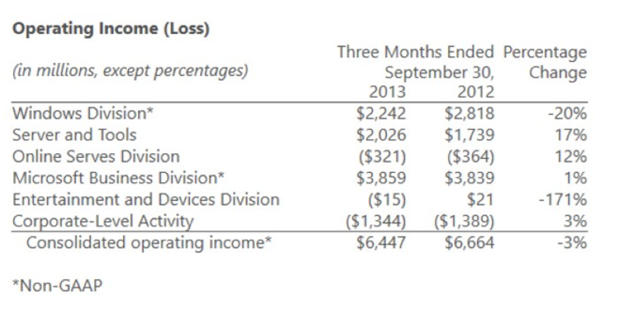
With a new CEO coming to Microsoft soon, the shortlisted candidates are revealing pieces of their own vision for the company. One of the proposals said to be under consideration is the sale of the Xbox division. Yes, you read that correctly. Xbox might be one of Microsoft’s 16 billion-dollar businesses but it is not guaranteed a spot in the company’s near future. The company is currently transforming into a ‘devices and services’ company and Xbox doesn’t ‘support its core business’. If the next CEO does sell Xbox, what does this mean for PlayStation’s future?
How Microsoft got to this point, where the trends are going
Investors want a change of direction and strategy and they seem delighted to see the current CEO of Microsoft leave. Shares went up as much as 10% after his announcment of retirement. Below, under Aug 23, you may like to read the shares surge to see more about what investors thought about the direction that the company had been taking under CEO Steve Ballmer. It seems that the consumer side of Microsoft is diminishing – Ballmer recognized that the company’s future lies in enterprise, not consumer operations.
Todd Lowenstein, a fund manager at Highmark Capital Management Inc. said of an Xbox sale:
(Xbox) … looks like an attractive standalone business that could hold up on its own…Xbox seems like it would be the most mature candidate with the best growth potential and the most established to stand on its own.
Key dates in the back story
- Aug 23 – Microsoft CEO announces retirement within 12 months, shares surge
- Sep 3 – Microsoft buys Nokia’s phone business for €5.4bn/$7.1bn, Nokia CEO Stephen Elop returns to Microsoft as new Devices chief
- Nov 8 – Reports come in that Stephen Elop, one of the forerunner CEO candidates, is seriously considering selling the Xbox division

Former Nokia CEO, new Microsoft Devices chief
According to the same source, Stephen Elop’s intention is to bring the Office products front and center on as many devices as possible, across all mobile and tablet operating systems. That’s right, the plan is to sell the Xbox division while concentrating on Office. Gamers everywhere must be rolling over laughing. If you’re confused about this, most PlayStation fans would likely recognize that Microsoft’s Xbox at least provided serious competition in recent years. It’s profitable and successful; it seems almost unthinkable that this would be sold. Note, the man said to be considering this, is also the man responsible (CEO) for Nokia’s stubborn avoidance of Android and its untimely crash into the ground after 14 years of dominating global mobile phone sales. He is currently the devices chief at Microsoft – including Xbox. That’s why it’s possible.
The other rumoured shortlisted candidates include:
- Alan Mulally, current Ford Motor CEO
- Kevin Turner, Microsoft COO Kevin Turner,
- Satya Nadella, Microsoft chief of enterprise software
- Tony Bates, Microsoft chief of strategy
Xbox performance within Entertainment and Devices Division
This is the most recent quarterly performance for Microsoft as a whole. Xbox is listed under the Entertainment and Devices division. It’s the third poorest performance across the company, with a $15 million loss. At the same point in 2012 it posted a $21 million profit – but that’s nothing compared to the Windows Division at $2.8 billion or the Business Division at $3.8 billion. They can’t blame all of that on R&D for the Xbox One. More importantly, investors are looking to the future and they don’t see Xbox in it. Previously, other divisions of Microsoft supported Windows. Microsoft has made it clear that it is transforming into a devices and services company, not software as in the past. Also, this suggests a possible departure from trying to ‘get a place in every living room’ via entertainment. Investors wonder how Xbox would fit in if enterprise is the future in their eyes.

Microsoft 3 Months to September 2013 Operating Income – Loss
You can view more data directly from Microsoft here.
Possible Xbox sale – not closing
The suggested proposal is to sell the Xbox division as a profitable, going concern. There is no plan to wind Xbox down. The next question has to be: who would buy it? The list is so wide open, perhaps there’s no crazy suggestion. Intel? Apple? Google? Valve? A consortia? A Chinese company? (You can ask this in almost any business question these days) You? Rockstar? OK, even if you and Rockstar are less likely candidates, there is still the potential that the buyer would: a) have a strong vision for its future, or b) inject considerable capital / technology / patents into the fold. If a very innovative and well-capitalized company did buy Xbox, that could create an even bigger shark in the water for Sony in the future.
Tim Schwartz of Schwartz Investment Counsel Inc. commented:
There’s some value there that clearly could be unlocked if they chose to go that route…I’d be in favor of them having two separate companies
If a sale did happen, there would also be a ‘change of guards.’ The handover period from one company to the next would create a period of unsettling change even some upheaval, a disruption to innovation and creation. This would be a weak point in time and if it follows a successful PS4 launch, then presumably the odds would be stacked against the new company for some time, perhaps the lifetime of the Xbox One. The buyer could take as long as the midpoint of the PS4 lifecycle to produce something of its own.
Sony: Competition? What competition?
In the earlier years of the PS3, Nintendo surprised you, me, and even itself with the incredible popularity of the Wii console. Then it launched the Wii U and it all came to an end. Nintendo has considerable difficulty as a rival in this generation of consoles (portable aside). Even if the Wii U doesn’t disappear quickly, it’s not going to challenge the PS4; that would be like comparing the sales of a Ford Fiesta and a Ferrari. They are marketed differently, aimed at different people; it’s high performance vs. affordable fun. People can own both – but they are still marketed differently.
The next in line is the Xbox brand. It is still speculation that it will be sold, but you can count that it’s ‘on the table’. If Stephen Elop becomes the CEO or one of the other candidates sells the Xbox division anyway, there will be the changeover period as mentioned above, a period of time when innovation and creation are disrupted and the new owner presumably merges the company with its own. In the most optimistic of expectations, that could take a year. If the PS4 lead is as powerful as anticipated, then that is one year that the Xbox One can’t afford to lose. Besides, the new owner will have to eliminate that Windows 8 Fisher-Price colour explosion from the user interface of the Xbox One and also remove Bing which is said to be wound-down under Elop. It might be necessary to ‘re-imagine‘ the entire interface. Perhaps some agreement could be made to license particular details for a set number of years until the new owner has adequate time to start fresh.
What about Sony? If Elop becomes CEO of Microsoft, then watch Sony’s financial accounts for details of mass-champagne purchases. There could be balloons. One benefit of an Xbox sale for Sony is that the Xbox brand would be de-coupled from a media and entertainment mammoth. Sony, Microsoft, Apple, Google and Amazon are expanding in such a way as to try to connect devices and media in ‘walled gardens‘. The intention is to make a consumer so comfortable after buying a device and say some apps or movies, that it becomes expensive (prohibitive) to switch from say iOS to Android. You would lose your right or ability to access your paid content on your opposing device. Xbox ejected from Microsoft takes it out of one of these walled gardens. Sony can tap into its broad network of music artists under its music labels, its prestigious film and TV entertainment networks and connect these with your PlayStation – and Xperia smartphone or tablet if you have one of those too. Any new owner of the Xbox business would have to start to branch out deals with media companies to replace this, or perhaps they would prefer to bring Xbox back to being a games machine – and not a media device.
Imagine being a Sony investor watching this. Nintendo is confused why everyone didn’t love the Wii U and the vultures are circling the Microsoft CEO spot. One of the hot candidates is said to be ready to spin-off the Xbox brand. It’s well-documented now that Sony’s investment in the Ps3 took years to produce ROI (return on investment), but it has now and is apparently leading sales in this console generation. With the Ps3, the slower, steadier horse may have won the race. The tenacity has paid off and it suggests Sony’s PS1, PS2 and PS3 success wasn’t luck, these guys really have gaming in their blood, they are competent. Selling the Xbox brand, besides being a casualty in a changing technological environment and now outside Microsoft’s strategy and key strengths, is partly failure. They didn’t match Sony, despite doing what Microsoft does best – pump as much cash at something and hope something sticks. The purchase of Nokia is a repeat of this, but that’s another article. Sony’s world-famous PlayStation (global valuable brand) will have survived as the last man standing.
![]() Note from Sohrab Osati
Note from Sohrab Osati
Editor-in-Chief
One of the interesting things about the Xbox as a platform has been how different it’s been from the over all Microsoft vision and strategy. While a fine gaming console in its own right, the Xbox and Xbox 360 have never done anything to further Microsoft in any meaningful way, outside of having a brand that people actually like. On the other hand, PlayStation is part of a core Sony business plan that helps drive quite a bit of revenue. While the Xbox brand brings in quite a bit of that, compared to products like Windows and Office, it’s a blip on the MS balance sheet.
One cannot deny the success of the Xbox brand, but the truth of it is that it was never built on core principles and instead built on a house made of cash. The 360 has always commanded a lower price point than the PS3. The reasoning behind it is that Microsoft has such a huge cash pile and revenue stream that they could afford to take the financial hit and sell each unit at a loss in order to push the brand while Sony couldn’t do that with the PS3. In fact, each PS3 for a majority of its lifetime sold at a loss; even the $600 launch consoles and Sony had only priced it at the given price so they could move some units. Otherwise, their strategy wasn’t the same as MS where they could truly afford to take the hit. Since then, the 360 has had some key 3rd party exclusives like Grand Theft Auto and Call of Duty DLC that PlayStation fans would only get months later thanks to the million they pay developers. Equally, MS was able to push devices like Kinect onto the masses (despite little use after purchase) thanks to a massive marketing campaign which tallied at $500 million, and that’s just for the Kinect. I’m not entirely sure Sony has spent $500 million on the entire PS3 campaign due to budget restriction.
I point all of this out to show that a large reason the Xbox brand has enjoyed such success is because of the amount of money MS has been able to invest in the system and rest assured, if Sony had the financial power to do the same, they likely would. However, as I stated earlier, I’m not entirely sure what MS hopes to achieve with Xbox. Yes, the Xbox One is more closely tied with the MS ecosystem with Skype, Bing search, and select Windows app support, but does that justify the expense of the brand?
A recent study has revealed that, while the Xbox division brings in revenue for MS, it’s actually never made a profit. In fact, it’s believed that the Xbox division loses around $2.5 billion each year and that MS has been able to mask the loss thanks to Android. For those unfamiliar, due to some patents that the company holds, Microsoft receives a small payment on each Android handset that is sold. So if we take into account that the division is actually responsible for a loss each year and it’s not tying into the overall MS vision, then on a pure dollars and cents term, why should the next MS CEO keep the division? An argument that’s been made is that the Xbox brand is good PR brand for MS and helps keep a key demograph (16-35) in the MS circle in hopes that they move onto other MS devices like Windows (Surface, Windows Phone), but I’m not sure if that’s truly working.
If the story about the real costs of the Xbox division are true, then there is no way MS could spin off the company without continuing to pump massive amounts of cash into it, at which point, why even bother with a costly spin-off? On the other hand, if MS were to sell the Xbox division, I’m not sure any company could afford to purchase and sustain it, nor would they be able to turn around the business so fast since so much of the underlying parts of the Xbox brand are tied to MS infrastructures like Xbox Live which couldn’t easily be migrated to say Amazon or Intel. Rest assured Xbox fans, if such a thing were to happen, it likely won’t happen for years to come as the game plan for the Xbox One is likely set in stone for the next 3 years.
Discuss:
What do YOU think will happen to PlayStation if Xbox is sold to another company?
